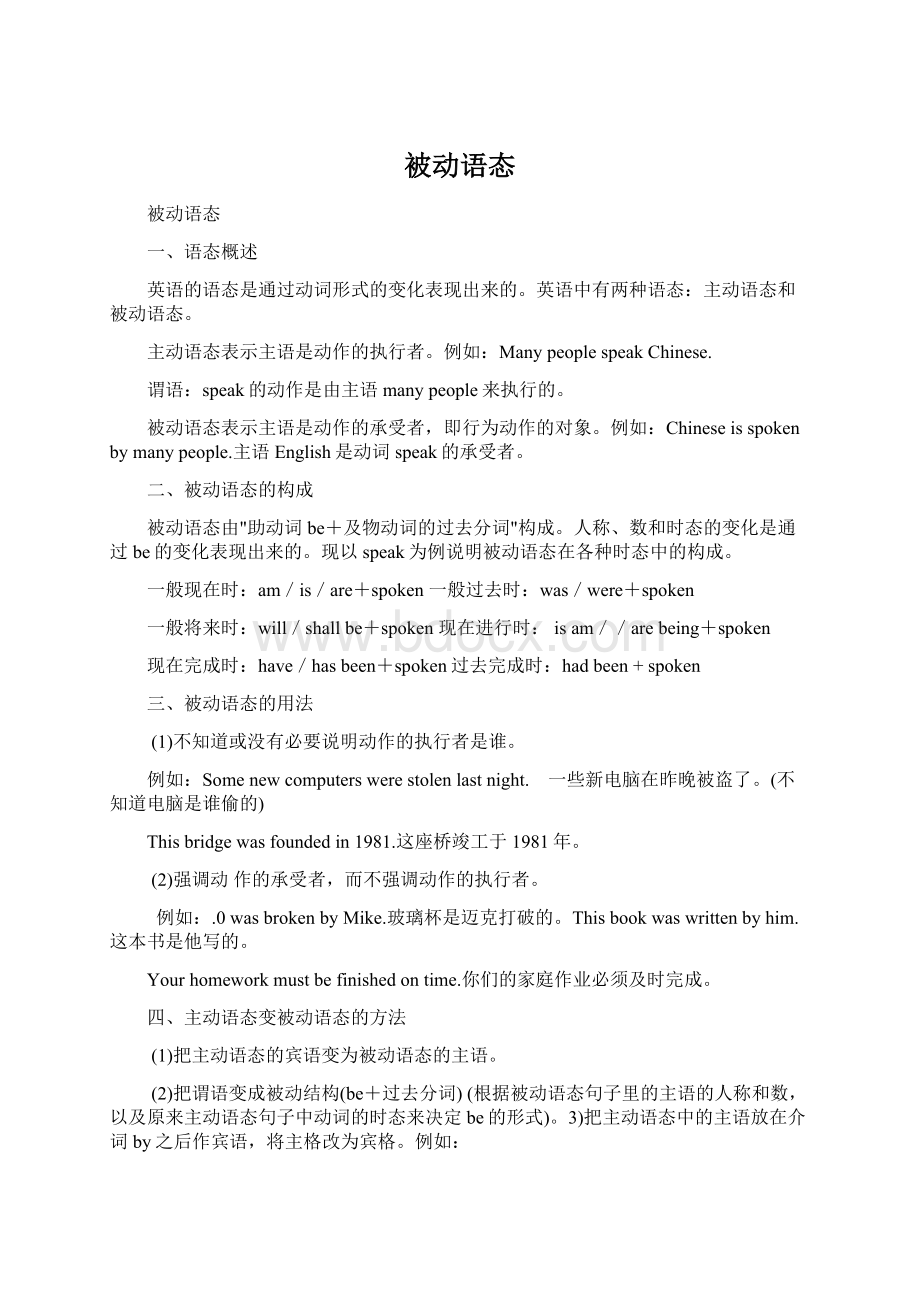被动语态.docx
《被动语态.docx》由会员分享,可在线阅读,更多相关《被动语态.docx(5页珍藏版)》请在冰豆网上搜索。

被动语态
被动语态
一、语态概述
英语的语态是通过动词形式的变化表现出来的。
英语中有两种语态:
主动语态和被动语态。
主动语态表示主语是动作的执行者。
例如:
ManypeoplespeakChinese.
谓语:
speak的动作是由主语manypeople来执行的。
被动语态表示主语是动作的承受者,即行为动作的对象。
例如:
Chinese isspokenbymanypeople.主语English是动词speak的承受者。
二、被动语态的构成
被动语态由"助动词be+及物动词的过去分词"构成。
人称、数和时态的变化是通过be的变化表现出来的。
现以speak为例说明被动语态在各种时态中的构成。
一般现在时:
am/is/are+spoken一般过去时:
was/were+spoken
一般将来时:
will/shallbe+spoken现在进行时:
isam//arebeing+spoken
现在完成时:
have/hasbeen+spoken过去完成时:
hadbeen+spoken
三、被动语态的用法
(1)不知道或没有必要说明动作的执行者是谁。
例如:
Somenewcomputerswerestolenlastnight. 一些新电脑在昨晚被盗了。
(不知道电脑是谁偷的)
Thisbridgewasfoundedin1981.这座桥竣工于1981年。
(2)强调动作的承受者,而不强调动作的执行者。
例如:
.0wasbrokenbyMike.玻璃杯是迈克打破的。
Thisbookwaswrittenbyhim.这本书是他写的。
Yourhomeworkmustbefinishedontime.你们的家庭作业必须及时完成。
四、主动语态变被动语态的方法
(1)把主动语态的宾语变为被动语态的主语。
(2)把谓语变成被动结构(be+过去分词)(根据被动语态句子里的主语的人称和数,以及原来主动语态句子中动词的时态来决定be的形式)。
3)把主动语态中的主语放在介词by之后作宾语,将主格改为宾格。
例如:
Allthepeoplelaughedathim.Hewaslaughedatbyallpeople.Theymakethebikesinthefactory.
Thebikesaremadebytheminthefactory.Hecutdownatree.Atreewascutdownbyhim.
五、含有情态动词的被动语态
含有情态动词的主动句变成被动句时,由"情态动词+be+过去分词"构成,原来带to的情态动词变成被动语态后"to"仍要保留。
Wecanrepairthiswatchintwodays.Thiswatchcanberepairedintwodays.
Theyshoulddoitatonce.Itshouldbedoneatonce.
被动语态八注意
1.我们知道,主动语态变为被动语态时,通常将主动语态中的宾语变为被动语态的主语;主动语态的主语变为由介词by引导的宾语;谓语动词变为被动语态“be+过去分词”形式,例如:
Everyonelikestheinterestingfilm.(主动语态)→Theinterestingfilmislikedbyeveryone.(被动语态)
Theyusedknivestocutthings.(主动语态)→Kniveswereusedtocutthings.(被动语态)
但是,并非所有由“be+过去分词”构成的形式就是被动语态。
有时过去分词已经变为形容词,表示一种状态。
试比较:
MybrotherisveryinterestedinEnglish.我哥哥对英语非常感兴趣。
(状态)
MybrotherwasinterestedbywhatItoldhim.我告诉他的话让我哥哥非常感兴趣。
(动态)
2.在被动语态中谓语动词一定是及物动词,也就是说必须跟宾语的动词。
如:
Wecanmakemetalsintodifferentshapes.(主动语态)→Metalscanbemadeintodifferentshapes.(被动语态)
在主动语态中make是及物动词,其动作的承受者即宾语是metals。
但是,并非所有的及物动词都有被动语态。
比如,表示静态的动词(have、belongto)、宾语是反身代词或相互代词等。
例如:
Hehasanicehouse.他有一所漂亮的房子。
Wemusthelpeachother.我们应该互相帮助。
3.主动语态中的主语在变为被动语态时通常变为由介词by的引出的宾语。
如:
Theyhavealreadycutdownthetrees.→Thetreeshavealreadybeencutdownbythem.那些树木已经被他们砍光。
如果谓语动词是know,在变为被动语态时,原来的主语变为由to引出的宾语。
如:
Manypeopleknowhimverywell.→Heiswellknowntomanypeople.很多人都非常了解他。
注意:
我们之所以用被动语态是因为我们不清楚动作的执行者、或没有必要指出动词的执行者等。
因此很多被动语态没有由by引出的宾语。
如:
Peoplemaylosetheirlivesandhomesortheymaybeinjuredbadlyinafire.在大火中人们可能失去性命和家园,要不就是严重烧伤。
Itisusedforprotectingthefiremanfromsmokimg.它用来保护消防人员以避免吸进烟雾。
4.在主动语态变为被动语态时,时态一般应保持一致。
如:
Wewillbuildmorefactoriesinmyhometown.→Morefactorieswillbebuiltinmyhometown.我们家乡将要建起更多的工厂。
为此,我们必须记住以下某些时态的被动结构:
do(es)→is/am/aredone did→was/weredonehave/hasdone→have/hasbeendone willdo→willbedone
bedoing→bebeingdone
5.某些动词可以跟双宾语如give、pass、bring、write;buy、make等,在变为被动语态时如果直接宾语变为被动语态中的主语,则间接宾语通常由介词to、for引出。
例如:
Mysistergavemeanicewatchformybirthday.→Anicewatchwasgiventomebymysisterformybirthday.我过生日时收到了姐姐的一块手表。
Theyhaveboughtusmanybooks.→Manybookshavebeenboughtforusbythem.很多书都是由他们给我们买的。
6.某些动词make、hear、see、watch等在主动语态中,其宾语补足语要求用不带to的不定式。
但在变为被动语态时通常省略的不定式符号to必须恢复。
如:
Hemadeuscleantheclassroomafterschool.→Weweremadetocleantheclassroomafterschool.我们被迫在放学后打扫教室。
Isawhimcomeintotheroom.→Hewasseentocomeintotheroom.人们看见他进了屋子。
7.在主动语态中如果谓语动词是含有介词或副词的动词短语,变为被动语态时不能丢掉该介词或副词。
如:
Theymusttakegoodcareofthechildren.→Thechildrenmustbetakengoodcareof.孩子们必须小心照看。
8.英语中某些动词如sell、lock、draw、start等在否定句、进行时或用在某些形容词、副词前可以表示被动意义。
如:
Thiskindofbookssellswell.这种书畅销。
Thedoorwon’tlock.门锁锁不上。
被动语态专练
选择最佳的答案填空:
1.It____thatChinahassentupanotherman-madesatellitesuccessfully.
A.wasreportB.isreportedC.reportedD.isreporting
2.___isknownaboutthetrafficaccident,foritisstillkept______asecret.A.Nothing,forB.Little,asC.Alittle,atD.Few,on
3.MayIuseyourcar?
Mine______foralongtime.
A.hasbrokenB.hasbreakdownC.hasbeenbrokenD.isbroken
4.Onemorebridge______theChangjiangRiverinafewyears’time.
A.willbebuiltonB.willbuiltaboveC.willbebuiltacrossD.willbebuiltover
5.Thesign“NOPHOTOS”isoftenseen________.A.onaboxB.atamuseumC.inastreetD.atastation
6.Olderpeoplemust_______well.A.lookafterB.takecareofC.lookedforD.betakencareof
7.Look!
Howbigtheeggs______bythehenare!
A.laidB.waslayingC.laysD.werelaid
8.DoyouknowwhenthePLA_______?
A.foundB.wasfoundC.wasfoundedD.founded
9.Drivingfast_______himhislife.Whataseriouslessonitis!
A.paidB.costC.spendD.took
10.Thelittleboywasmadebyallofus_______happily.A.laughedB.laughC.tolaughD.laughing
11.Theappletrees_______,andtheapplesonit_______.
A.growwell,lookgoodB.aregrownwell,lookswellC.aregrowngood,lookedwellD.growswell,arelookedgood
12.Shedoesn’tknowwhat________.A.itcallsB.isitcalledC.itiscalledD.doesitcall
13.Thebigbowlwasusedfor________wine________.A.keep,warmB.keep,warmC.keeping,warmlyD.keeping,warm
14.Theboywasseen________hisbikeamomentago.A.felloffB.tofalloffC.fallofD.tofalldown
15.—Haveyoumovedintothenewhouse?
Notyet.Therooms_____.
A.arebeingpaintedB.arepaintingC.arepaintedD.arebeingpainting
16.—IsawAnn______agreendressatthemeeting.—Ithinkshelooksbetter_____red.
A.dressed;inB.puton;wearC.wearing;inD.wear;puton
17.Idon’tknowTom’stelephonenumber.Willyouplease__________inyouraddressbookforme?
A.lookupitB.lookitupC.lookforitD.lookatit
18.Thereisanotice.It__________“Nosmoking”.A.saysB.writesC.hasD.have
19.I’mafraidtherearesomemoretrees______________.A.toplantedB.forplantingC.beplantedD.tobeplanted
20.It’ssaidthatanothersociety_________duringthelastfewmonths.A.hasfoundB.hasbuiltC.hasbeenfoundedD.wasbuilt
21.Whatanicegarden!
Howwellit________after!
A.haslookedB.looksC.islookedD.islooking
22.MybikewasbrokenonthewayhomeyesterdayandIhadit________.A.repairingB.repairedC.repairD.torepair
23.Thiskindofsilkismade______SuZhou.
A.inB.ofC.byD.at
24.Wefoundthecomputer__________.
A.usefulmachineB.anusefulthing
C.agoodinventionD.goodinventions
25.He’shardlygivenanypresentsonhisbirthday,__________?
A.hasheB.isheC.hasn’theD.isn’the
26.Thetreesonbothsidesofthestreet________verywell.
A.aregrowingB.aregrownC.havebeengrownD.grown